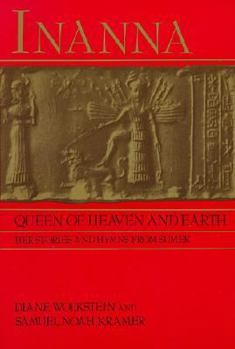Inanna
Select Format
Select Condition 
Book Overview
A fresh retelling of the ancient texts about Ishtar, the world's first goddess. Illustrated with visual artifacts of the period. A great masterpiece of universal literature.--Mircea Eliade
Format:Paperback
Language:English
ISBN:0060908548
ISBN13:9780060908546
Release Date:August 1983
Publisher:Harper Perennial
Length:256 Pages
Weight:0.65 lbs.
Dimensions:0.7" x 6.1" x 9.0"
Customer Reviews
4 ratings
Inspiring window on the great Sumerian goddess
Published by Thriftbooks.com User , 22 years ago
The result of a collaboration between Sumerian scholar Noah Kramer and folklorist Diane Wolkstein, this book is a thoughtfully annotated translation of the major Sumerian cuneiform texts devoted to the goddess Inanna-among the oldest religious texts in the world. It is illustrated with black-and-white reproductions of ancient Sumerian art, mostly on clay tablets.Our understanding of Sumerian culture continues to grow as new texts are found and our perceptions change. This book was published in 1983, and included material unknown to the general public at the time. There are four major stories of Inanna told here: "The Huluppu Tree," "Inanna and the God Of Wisdom,""The Courtship of Inanna and Dumuzi," and the extended epic "The Descent of Inanna." Seven hymns to the goddess round out the collection.In "The Huluppu Tree," we meet the adolescent Inanna, expectantly awaiting the attainment of her queenship. The Huluppu tree, which she has planted and tended as a symbol of her hopeful authority, becomes infested with evil creatures, like personal demons, that will not depart and bring her to despair. She eventually appeals to Gilgamesh to vanquish the demons, and they exchange gifts made from the wood of the tree, bringing them both to greater power.In "Inanna and the God of Wisdom," Inanna, now sexually mature but still youthful and unproven, is welcomed by Enki, God of Wisdom, who acts the role of proud grandfather, giving a feast in her honor. Enki's magnamity increases as he drinks, and he ends up offering Inanna all the magical keys to human civilization. Inanna, with enthusiastic politeness, accepts the gifts, and then makes a quick exit, getting a head start before Enki thinks better of his generosity and sends his monsters in pursuit of the errant goddess. Inanna, with the help of her trusted companion goddess, gets passed the monsters and arrives in Uruk withher magical cargo, where she comes into her full power. Enki, apparently wise enough to let go of his greed in the face of fate, acknowledges Inanna's victory and ascendance.In "The Courtship of Inanna and Dumuzi," Inanna, after some initial resistance, enters into an erotic courtship with Dumuzi the shepherd. This text is strangely alluring, moving with untroubled ease from sexual frankness to touching detail. (The scene where Dumuzi knocks on the door of Inanna's house for the first time feels like it could have come straight from a modern teenager's diary). After the marriage is consummated, Dumuzi curtly informs Inanna that he's going to be very busy being king now-don't wait up, hon. This poignantly rapid slide from courtship to neglect sets the scene for events in the next narrative.In "The Descent of Inanna," the goddess, now Queen of Heaven and Earth, finds herself drawn to enter the underworld, realm of the dead, ruled by her evil and somehow tragic sister-self, Ereshkigal. One by one, she is stripped of all the symbols of her power at seven gates, to be left naked and alone befor
Stunning
Published by Thriftbooks.com User , 23 years ago
In the "White Goddess", Robert Graves speaks of true poetry as that which sends chills up your spine because it clearly has divine origins. While Graves' work does not meet that standard, "Innana" more than does so. With the fist stanza, "In the first days, in the very first days, in the first weeks, in the very first weeks, in the first years, in the very first years", you enter a primal Dreamtime where the the Goddess exists as a real being made tangible by enchanting words. It takes a true poet to translate words from a dead language into a modern one and have them retain their effect. Wolkstein does this with grace and power. The imagery of the tales and hymns themselves is lush, erotic, and real. I reccomend this book for anyone interested in finding a sacred text that opens up a living channel to the Goddess.
Lady of the Morning and Evening Star
Published by Thriftbooks.com User , 23 years ago
This is a wonderful translation of the hymns to Inanna. I highly recommend it to those who are interested in ancient Sumer. However, I would like to add a cautionary note. These hymns were written in a much earlier time by a people not bound by our victorian prudery. They revelled in and honored the body beautiful. Much of the language is extremely frank.The hymn regarding the courtship of Dummuzi and Inanna is indeed beautiful and touching. It is an intimate peek into a very different time and culture where woman was treated with reverence and respect. This book would make a wonderful addition to any personal library, especially those interested in ancient civilizations.
Great stories, beautifully translated.
Published by Thriftbooks.com User , 25 years ago
Anyone who wonders what life and love were like in pre-patriarchal times should read this book. In fact, anyone who has a heart should read this book. It contains a beautiful, unique love story, and tales of a great and karismatic goddess-queen, Inanna. My wife and I read the love story to each other now and then, and weep with joy, love, and sadness every time. The book shows just how much a great translator, Kramer, and a great story teller, Wolkstein, can do to bring alive a culture that is completely foreign to us.





